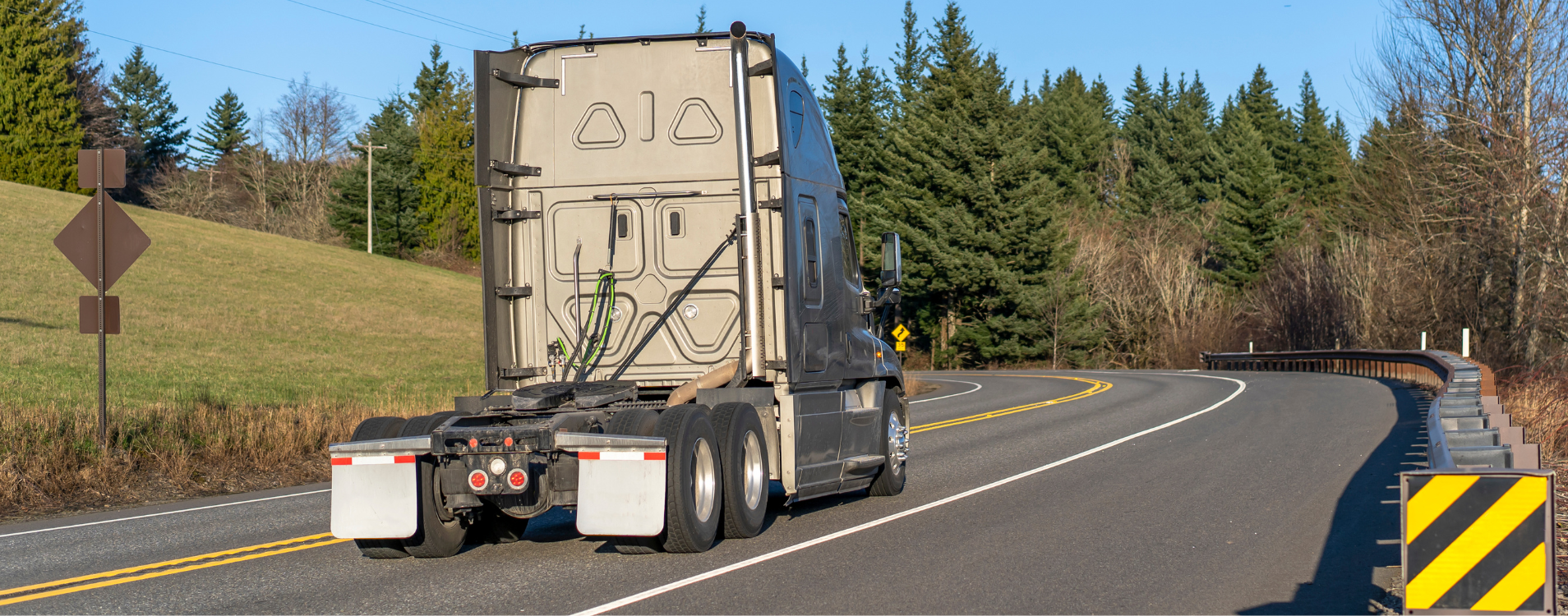All your questions about power-only trucking answered
Have you ever wondered if it’s possible to run a trucking company without owning a trailer? The answer is yes. It’s called power-only trucking.
In this article, we’ll explain what power-only trucking is, what the benefits are, and how to know if it’s the right way to run your business. Whether you’re considering making the switch to power-only or just looking to learn more about this growing trend in the trucking industry, read on to discover everything you need to know.
Leer este artículo en español.
What is power-only trucking?
A power-only carrier is a type of trucking company that provides transportation services using only the power unit, or tractor, of a commercial truck. Unlike traditional carriers that own and operate their own trailers, power-only carriers do not own any trailers and instead rely on customers, brokers, or other carriers to provide trailers for them to haul.
The power-only carrier is responsible for attaching and hauling the trailer, but not for loading or unloading the cargo. This business model can be advantageous for carriers as it allows them to focus on driving and operating their equipment while avoiding the costs and responsibilities associated with trailer ownership and maintenance.
What are the benefits of being power-only?
There are several advantages of being a power-only carrier, including:
- Flexibility: As a power-only carrier, you have the flexibility to choose the types of loads and routes you want to haul. This allows you to tailor your business to your preferences and maximize your earnings potential.
- Reduced expenses: Power-only carriers typically have lower overhead costs than traditional carriers because they do not own or maintain trailers. This means that they do not have to worry about expenses such as trailer repairs, maintenance, or storage.
- Improved efficiency: By not owning trailers, power-only carriers can focus on driving and delivering loads, rather than spending time loading and unloading trailers. This allows them to complete more deliveries and increase their earning potential.
- Increased earning potential: Power-only carriers can often earn higher rates per mile than traditional carriers, as they are providing specialized service and have the flexibility to choose their loads and routes.
- Diversified customer base: Power-only carriers have the opportunity to work with a variety of customers, including freight brokers, retailers, manufacturers, and logistics companies. This diversification can help to ensure a steady stream of business and reduce the risk of relying too heavily on one customer.
Overall, being a power-only carrier can be a lucrative and flexible option for those who prefer to focus on driving and delivering loads without the added expense and responsibility of owning and maintaining trailers.
What are the disadvantages?
While there are several advantages to being a power-only carrier, there are also some disadvantages to consider, including:
- Limited control over trailers: As a power-only carrier, you do not own or control the trailers you are hauling, which means that you may be limited in your ability to make certain decisions, such as where to drop off the trailer or how to load it.
- Higher risk of downtime: Because power-only carriers do not own trailers, they may experience more downtime between loads as they wait for brokers or shippers to provide them with information about the trailers.
- Need for strong communication skills: Power-only carriers need to be skilled communicators in order to work effectively with brokers and shippers, as well as other carriers and drivers. This includes being able to negotiate rates, coordinate pick-up and delivery times, and handle any issues that may arise while changing trailers.
- Potential for higher insurance costs: Power-only carriers may face higher insurance costs because they are responsible for transporting other companies’ trailers and cargo. Most brokers will require that you have trailer-interchange insurance in case of accidents.
Overall, while there are many benefits to being a power-only carrier, it is important to consider the potential drawbacks and determine whether this type of business model is the right fit for your skills, resources, and goals.
Can I be a power-only owner-operator with one truck?
Yes, it is possible to be a power-only owner-operator. As a power-only owner-operator, you would own and operate your own tractor but lease it out to a carrier or run it under your own authority. This allows you to focus on driving and earning income while the carrier or broker handles the trailer and freight logistics.
To become a power-only owner-operator, you would need to have your own tractor, as well as the necessary licensing, insurance, and permits. For a full list of licenses and permits needed in trucking, read this blog here.
Keep in mind that as a power-only owner-operator, you would be responsible for all of the costs associated with maintaining and operating your tractor, such as fuel, maintenance, and repairs. You would also need to be prepared to handle the administrative and logistical tasks associated with managing your own business, such as bookkeeping and record-keeping. We recently published a guide to financial management in trucking – check that out here.
How can I become a power-only carrier?
To become a power-only carrier, you will need to follow these general steps:
- Start with a business plan: to determine your rates and profit goals, you need to start by understanding your costs, market demand, and competition. Read more about business plans for trucking companies here.
- Acquire a power unit: As a power-only carrier, you will need to acquire one or more power units (tractors) to haul the trailers or containers. You can either purchase new or used trucks or lease them from a trucking company. Click here to read our guide on financing rigs.
- Get the proper licenses and permits: Before you can start operating as a power-only carrier, you will need to obtain the proper licenses and permits. The specific licenses and permits required will depend on your location and the type of freight you plan to haul. Check with your local authorities to determine the requirements and read this article for all the licenses and permits a trucking company might need.
- Get insurance: As with any type of trucking operation, you will need to obtain insurance coverage to protect your business and your clients. This can include liability insurance, cargo insurance, and physical damage insurance. Read this article for the full guide on trucking insurance.
- Establish relationships with shippers and brokers: You will need to establish relationships with shippers and brokers who need power-only carriers to move their cargo. You can find shippers and brokers through industry associations, load boards, or by networking with other carriers.
- Manage your business: You will need to manage your business operations, including dispatching, scheduling, and financial management.
- Ensure compliance with regulations: As a power-only carrier, you will need to ensure compliance with regulations related to safety, hours of service, and taxes.
Starting a power-only carrier business can be a complex process, and it’s important to do your research and seek professional advice to ensure that you are meeting all legal and regulatory requirements.
How can I find power-only loads?
There are several ways to find power-only loads as a carrier. Here are some options:
- Load Boards: Load boards are online marketplaces that connect carriers with shippers and brokers who have freight to move. Some load boards specialize in power-only loads, while others offer a mix of load types. Some popular load boards include DAT, Truckstop.com, and 123Loadboard.
- Freight Brokers: Freight brokers act as intermediaries between shippers and carriers, and they often have access to a wide range of power-only loads. You can find freight brokers by searching online directories or by networking within the industry.
- Industry Associations: Industry associations such as the Intermodal Association of North America (IANA) or the National Motor Freight Traffic Association (NMFTA) can provide resources and connections to help carriers find power-only loads.
- Direct Shippers: You can also approach shippers directly to see if they have any power-only loads that need to be moved. This may require some research to identify shippers who have a need for power-only carriers, but it can be a good way to establish a long-term relationship with a customer.
What are the best load boards for power-only?
There are several load boards that are popular among power-only carriers for finding loads, including:
- DAT: DAT is one of the largest load board providers in the trucking industry and offers a dedicated section for power-only loads. Power-only carriers can search for loads based on their location, preferred trailer type, and other criteria.
- Truckstop.com: Truckstop.com is another popular load board that offers a dedicated section for power-only loads. The load board allows carriers to search for loads by location, trailer type, and other factors.
- 123Loadboard: 123Loadboard offers a wide range of load types, including power-only loads. Carriers can search for loads based on their location, preferred trailer type, and other criteria.
- NextLOAD: NextLOAD is a load board that focuses on providing carriers with accurate and up-to-date load information. The platform offers a variety of load types, including power-only loads.
For a full list of load boards, read this.
How do power-only loads work?
As a power-only owner-operator, the process of handling power-only loads typically involves the following steps:
- Finding a Load: you’ll typically use a load board to find available power-only loads. Once you find a load, you’ll contact the broker or shipper to negotiate the terms of the load, including the pick-up and delivery dates, the payment rate, and any other details.
- Confirming the Load: after negotiating the terms of the load, you’ll confirm the details with the broker or shipper and receive any necessary paperwork, such as a bill of lading or delivery instructions.
- Picking up the Trailer: when you pick up a trailer for transporting a power-only load, it will go one of two ways: (1) the trailer will already be loaded and you’ll be able to simply pick it up and head out to the load’s destination, (2) you’ll need to pick up the trailer in one location and take it to be loaded in another location. This depends entirely on the broker or carrier you’re working with and rates can be different depending on which scenario is true. This is why it’s so critical to understand all the details of a load before confirming.
- Transporting the Load: you’ll then transport the trailer to its destination. During transport, you’re responsible for maintaining the safety and security of the trailer.
- Delivering the Load: upon arrival at the destination, again, you’ll generally have one of two scenarios: (1) you’ll simply unhook the trailer or (2) you’ll get the trailer unloaded and take the trailer to another designated location. Regardless, you’ll obtain any necessary signatures or paperwork to confirm delivery.
Getting paid for power-only loads
As a power-only carrier, getting paid promptly for your hard work is essential to keep your business thriving. And that’s where factoring comes in – it allows you to sell your outstanding invoices to a third-party company for quick payment.
Bobtail is here to make it easy for you! We don’t believe in locking you into long-term contracts or charging you hidden fees. Factoring with Bobtail, you can trust that you’re getting a fair deal without any unexpected surprises.
Our user-friendly platform and mobile app make it easy for you to submit invoices and track your payments, so you can stay organized and focused on what you do best – hauling those loads! Whether you’re just starting out or looking to grow your business, factoring with Bobtail Capital can provide the financial stability and flexibility you need to succeed.
So why wait? Contact us today to learn more about how we can help you take your power-only trucking business to the next level!




